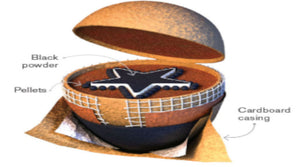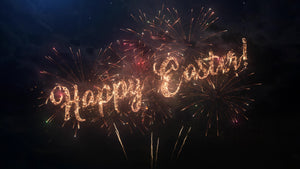Why do we Celebrate Easter?

Ever wondered why we celebrate Easter? Pyrotex has all the answers and how it is celebrated across the world?
Easter is a Christian holiday that celebrates the belief in the resurrection of Jesus Christ. In the New Testament of the Bible, the event is said to have occurred three days after Jesus was crucified by the Romans and died in roughly 30 A.D.
What is the Holy Week of Easter?
Palm Sunday

Maundy Thursday

This is the Thursday before Easter Day.
On Maundy Thursday Christians remember when Jesus ate the Passover meal with his disciples, breaking bread, and drinking wine. Christians refer to this meal as the Last Supper.
Many Christians remember the Last Supper by sharing bread and wine together in a church service called Holy Communion, Eucharist, or Mass. It is a reminder that Jesus sacrificed his life for mankind.
Good Friday

Good Friday is the Friday before Easter Sunday. It commemorates the execution of Jesus by crucifixion.
Good Friday is a day of mourning in church. During special Good Friday services Christians remember Jesus's suffering and death on the cross, and what this means for their faith.
In some countries, there are special Good Friday processions, or re-enactments of the Crucifixion.
Easter Sunday

Easter Sunday marks Jesus's resurrection. After Jesus was crucified on the Friday his body was taken down from the cross and buried in a cave tomb. The tomb was guarded by Roman soldiers and an enormous stone was put over the entrance.
On Sunday Mary Magdalene and some of Jesus's disciples visited the tomb. They found the stone had been moved and that Jesus's body had gone. Jesus was seen later that day by Mary and the disciples, and for forty days afterwards by many people. His followers realised that God had raised Jesus from the dead. Christians call this the resurrection.
So Why do we Celebrate Easter with Eggs?

An egg is a symbol of new life. For Christians, Easter eggs are used as a symbol for the resurrection of Jesus.
Christians believe that, through his resurrection, Jesus overcame death and sin. This offers people the promise of eternal life if they follow his teachings.
Nowadays, most Easter eggs are made from chocolate and covered in coloured foil. Traditionally though, chicken eggs would be hard boiled and then decorated by hand. Traditional Easter egg hunts remain popular with both Christian and non-Christian children.
So How is Easter Celebrated Around the World?
As Christians and Catholics have spread around the globe, There are now many countries that celebrate Easter Week.
Spain

Known in Spain as Semana Santa, or Holy Week, Easter is observed for an entire seven days on the Iberian Peninsula.
People parade through the streets in costumes or in hooded robes, carrying intricate religious floats depicting difference scenes from the bible, while often accompanied by live music. Some of the most well-known take place in Zamora, Valladolid, Seville, and Granada.
France

Much like in Spain, many of France's Easter customs stem from Catholic tradition and as such the holiday is usually a more religious affair than the UK's.
One such tradition dictates that church bells stop ringing around Easter as a mark of respect for Jesus' death, and to explain their silence children are told the bells have flown to Rome to be blessed by the Pope.
On the morning of Easter Sunday - Jesus' resurrection - the bells then fly back to France loaded with sweet treats which they drop into gardens for the children. Once they are back in their steeples they then start ringing joyfully again.
Easter in Poland, Ukraine, Hungary, the Czech Republic, and Slovakia

Across central and Eastern Europe an ancient tradition exists which sees people try to drench each other with water buckets of water, usually men soaking the women, on Easter Monday.
Known as Smigus-dyngus (Wet Monday) in Poland, Watering Monday in Ukraine, Watering in the Czech Republic and Slovakia and Sprinkling in Hungary, the ritual is supposedly based around women’s' fertility, with the water having a cleansing effect to make them healthy for the upcoming spring.
In Hungary participants will often dress up in folk costumes and the men will douse the women with buckets of water or perfume. In Poland, traditionally the women get soaked but today it has become more of a country-wide water fight. After the soaking, usually the women then provide the men with food and alcohol. Another Easter tradition exists these countries in which men whip women with a special handmade whip made from willow and decorated with ribbons. Not intended to be painful, it supposedly helps women keep their youth, health, and fertility throughout the year.
Easter in The Philippines

Devout Catholics in the Philippines will volunteer to be "crucified" on Good Friday to re-enact Jesus' suffering, in a particularly gruesome practice that has been condemned by the church.
Thousands watch the re-enactment, known as the San Pedro Cutud Lenten Rites, in the province of Pampanga, in which believers are nailed to crosses to atone for their sins or pray for others.
Penitents volunteer to have nails measuring two inches long hammered into their palms and feet by people dressed as Roman centurions and nailed to a cross. They are only taken down from the cross once they feel atoned of their sins.
The practice, which is believed to date to the 1950s, also sees other penitents flagellate themselves using bamboo sticks tied to a rope.
Easter in Bermuda

As you would expect from a tropical island, Easter is much more relaxed and a whole lot warmer than it is for us in Europe. Fittingly then, Bermudians of all ages like to celebrate Good Friday on the beach, where they fly both special homemade and store-bought kites.
The kites supposedly represent Christ's resurrection, and come in all manner of shapes, colours, and sizes. Some are so big they require several people to get it airborne. Along with kite-flying, Bermudian also enjoy eating fish cakes and hot cross buns at this time of year.
Well there we have it, if you didn't know about Easter before, you do now!! Only one last thing for us to say to all our customers and friends at Pyrotex, Happy Easter!!

- Peter Hemmings







Comments 1
Tom Archer
Never heard of Pyrotex Fireworks before last week, but what a find they have been!
Amazing selection of retail fireworks, outstanding knowledge of the products and unbeatable value!
Highly recommended.
Tom Archer.